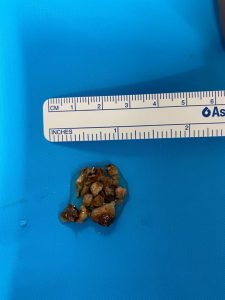Kidney Stones
Kidney Stones Video
What are kidney stones and how common are they?
What are the symptoms of kidney stones?
How are stones treated?
How can I prevent kidney stones?
Kidney Stones
The surgeons at Melbourne Urology Centre are experts in the treatment of kidney stones. They use a state-of-the-art high powered 120W Holmium laser and now have access to exciting new ‘Moses’ technology. This ground-breaking technology delivers more efficient energy transmission, enabling safe and rapid stone fragmentation with a 20% reduction in procedure time. Dr Shekib Shahbaz and Dr Tony de Sousa were the first surgeons to use this advanced technology in Victoria.
Fragmented kidney stone removed from the patient:

Kidney Stones Video
What are kidney stones and how common are they?
- Kidney stones are formed by crystallization of salts in the urine
- There are different types of stones however most are calcium-based
- Stones are very common; the lifetime risk is up to one in ten (men are at higher risk than women)
- After having one stone, the risk of getting another is up to 10% per year
What are the symptoms of kidney stones?
- The classic symptoms (renal colic) are: gripping flank/back pain, sweating and nausea
- Fever and chills may indicate infection
- Blood may be visible in the urine (haematuria), however this can have other causes and always needs to be investigated
- Stones may cause no symptoms nor signs at all and may be picked up incidentally on an ultrasound or CT scan
How are stones treated?
- Small stones may pass spontaneously, however larger stones often require intervention
- The surgeons at Melbourne Urology Centre are experts in all aspects of kidney stone treatment; depending on the size and location of the stone, they will determine the most appropriate treatment. This may include:
- Medical expulsion therapy (taking medication to aid passage of the stone)
- Minimally-invasive laser fragmentation – a small telescope (ureteroscope) is used to directly visualize the stone and fragment it with a high-powered laser
- ESWL – this non-invasive treatment uses a shockwave focused directly on the stone to fragment it
- PCNL – surgery is performed by direct access into the kidney (keyhole) for patients with extensive stone disease. Often a combined two surgeon ‘modified supine approach’ is utilised in these complex cases to allow for an efficient, safe and minimally invasive stone clearance.
How can I prevent kidney stones?
- If you have had a stone, you are at risk of further episodes
- Your doctor will discuss prevention strategies tailored to you, however there are some general tips:
- Drink plenty of water; if you drink enough water you can prevent stones, no matter what the cause. Aim to drink enough water to keep your urine a pale yellow colour. This may require 2L or more per day, depending on the weather, your level of activity, age and body size. Avoid dehydration!
- Reduce your dietary salt intake; there is generally more salt in our diet than we need, even without adding extra. Your body will get rid of any excess salt in the urine, this takes with it some calcium, increasing your risk of stone formation. Keep the salt shaker off the table!
- Add some lemon juice to your water; lemon juice may help to prevent some stone types, but at the very least it will make the water more palatable!
- Depending on your stone type, dietary modification may reduce your risk of recurrence. Always discuss this with your doctor before making changes.
Written by Dr. Shekib Shahbaz and Dr. Tony de Sousa
Kidney Health Australia, (2020), Kidney Stones, [https://kidney.org.au/your-kidneys/what-is-kidney-disease/types-of-kidney-disease/kidney-stones], accessed 17/2/21.
Dawson, C. H., Tomson, C. R. V., (2012), Kidney stone disease: pathophysiology, investigation and medical treatment, Clinical Medicine
